
Biology is the study of life and how biological processes affect our daily lives. Topics of study will include biodiversity, genetic engineering, problems associated with the expanding human population, the origin and diversity of life, functional morphology, ecology, and Darwinian evolution.
About The Program
The Biology Department offers a diversified program that examines the life sciences by integrating multiple disciplines, including the molecular nature of cellular structure and physiology, the evolutionary mechanisms of biodiversity, and the study of plant and animal communities in relationship to the environment. The curriculum is designed to promote discovery and problem solving through scientific methodology, with most courses featuring an integrated laboratory component. In addition to mastering concepts, students learn to see the biological sciences as a process of discovery through the completion of a mandatory experiential learning opportunity such as undertaking undergraduate research, completing an internship, studying abroad in the natural sciences, or enrolling in a field course at a biological or marine field station. In addition to core biology courses, students are required to complete additional coursework in other natural sciences. Both B.A. and B.S. degrees are offered in biology. The curriculum for each degree is designed to prepare students for advanced study in the health sciences and biological research, thereby enabling motivated individuals to pursue successful careers as physicians, veterinarians, biologists, environmental researchers, policymakers, public health professionals, scientific journalists, and educators.
Major: Biology (BA, BS)
Minors: Biology, Marine Science
Certificates: Certificate in Biotechnology, Certificate in Advanced and Applied Microscopy
Chair: Dr. Soraya Bartol
School: Joan P. Brock School of Mathematics and Natural Sciences
Why Study Biology at VWU?
Marlins IMPACT Scholarship Program
The Marlins IMPACT Scholarship Program provides need-based scholarships for academically talented undergraduates majoring in STEM disciplines at VWU in a national effort to increase numbers of students graduating in STEM disciplines and joining the U.S. STEM workforce.
Accelerated Degree Options
Early Assurance Program with Eastern Virginia Medical School
The Early Assurance Program with EVMS gives admission preference to VWU students interested in pursuing advanced degrees.
Joint Program in Medicine with Eastern Virginia Medical School
Upon completion of a 4-year bachelor's degree at VWU, students in this program are guaranteed admission in the Eastern Virginia Medical School.
Pre-admittance and Joint Degree Options in Pharmacy with Shenandoah University
Virginia Wesleyan University students are given priority status
into Shenandoah University's Bernard J. Dunn School of Pharmacy for Pre-Admittance and Joint Degree Options.
Pre-Engineering Program at ODU
The Pre-Engineering Program offers students the opportunity to earn both a Bachelor of Science degree from Virginia Wesleyan University and a Master's degree in Aerospace, Biomedical, Civil, Computer, Electrical, Environmental, Mechanical, Modeling & Simulation, or Systems Engineering from Old Dominion University.
Certificate in Biotechnology
Biotechnology is a broad interdisciplinary subject encompassing industries and fields involving some of the biggest challenges our society will face including medical & pharmaceutical technologies, agriculture, and the environment. It is founded on the knowledge at the intersection of chemistry and molecular biology, and is reliant on statistical modeling of “Big Data”. This certificate program is open to all students, but Biology, Chemistry, and Math majors with an interest in molecular biology are particularly encouraged to pursue it.
Course Number And Title |
Sem. Hrs. |
|---|---|
| BIO 132: Principles of Biology II: Cell Biology & Genetics | 4 |
| BIO 288 Genetics | 4 |
| CHEM 330: Biochemistry | 4 |
| MATH 210: Introductory Statistics | |
| MATH 310: Statistical Models | 4 |
Select one course from the following: |
4 |
Select one course from the following: |
2-4 |
| Total credit hours | 26-28 |
Certificate in Advanced and Applied Microscopy
This certificate recognizes students who demonstrate proficiency with multiple forms of advanced modern microscopy and are able to apply their knowledge to investigate natural phenomena. Given the diversity of instrumentation on campus, students will have some flexibility with respect to the equipment that they choose to master, but most will acquire practical experience with scanning electron microscopy, light (or infrared) and fluorescence microscopy. In general, certificates in microscopy are not common, but most require substantive coursework and the demonstration of competency with specific instruments and essential background information, usually through practical and written examinations. To earn this certificate, students must complete an independent research project that requires the application of at least one form of advanced microscopy.
Course Number And Title |
Sem. Hrs. |
|---|---|
Complete 8 hours of the following coursework: |
8 |
| Complete 4 hours of independent research: BIO 489: Research in the Natural Sciences CHEM 489: Research in the Natural Sciences EES 489: Research in the Natural Sciences |
4 |
| Complete proficiency exams for instrumentation used in courses taken to complete the 8 hours of coursework (minimum of 4 exams). | |
| Complete a comprehensive written exam reflecting the specific coursework taken to complete the 8 hours of coursework. | 8 |
| Participate in at least one Careers in Microscopy workshop. | |
| Total credit hours | 20 |
Equipment and Facilities
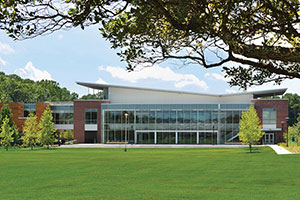
Greer Environmental Sciences Center
This 44,000 sq. ft. state-of-the-art facility provides unprecedented opportunities for students while fostering regional collaboration with organizations such as the Virginia Aquarium & Marine Science Center and the Virginia Institute for Marine Science (VIMS).
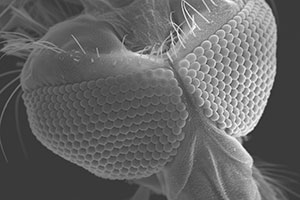
Scanning Electron Microscope
The microscope, the result of a $242,502 grant from the National Science Foundation, is equipped with energy dispersive X-ray spectroscopy, an accessory that enables the user to determine the chemical composition of a specimen.
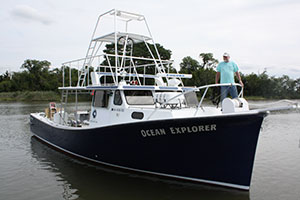
Ocean Explorer
The Chesapeake Bay, one of the largest estuaries in the world, is the perfect setting for Virginia Wesleyan students to engage in research and study. The Ocean Explorer research vessel transports students from land to sea, giving them hands-on experience to examine the historical utilization, ecology and cultures inhabiting the Chesapeake Bay, the human impact on the preservation of this system, and consider different issues affecting the watershed and its future.
Internships/Undergraduate Research
Biology students are offered the opportunity to conduct original scientific research in an area of interest. They work closely with one or more members of the natural science faculty to develop and conduct a research project, then present their findings orally during the semester’s undergraduate research symposium and as a formal research paper. Students are encouraged to present their findings at a conference. Biology students will coordinate internship placement with their supervising faculty member in their junior or senior year. Internships are an intensive study of a specific field of science through an on-site field experience with hands- on learning opportunities that are relevant to the chosen site.
Internship organizations in the Hampton Roads area are available to students such as:
- Chesapeake Bay Foundation
- Eastern Virginia Medical School
- Naval Medical Center Portsmouth
- National Oceanic and Atmospheric Administration
- Norfolk Botanical Gardens
- Sentara Health Systems
- The Elizabeth River Project
- Virginia Aquarium and Marine Science Center
- Virginia Institute of Marine Science
- Virginia Zoological Park
Study Away
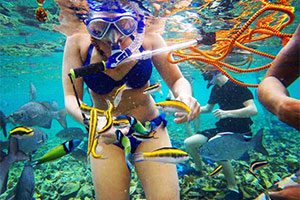
BIO 340: Tropical Marine Ecology
Description: This course provides an introduction to the major tropical marine habitats and the ecological processes that control tropical marine ecosystems with focus on coral reefs, mangroves and tropical seagrass beds. The increasing environmental degradation in tropical marine communities are also discussed. The course includes the option of completing an intensive field experience in the Florida Keys or a research paper examining tropical ecosystems such coral reefs, mangroves, or seagrass beds.
Destination: Florida Keys, FL
Past Study Away Courses
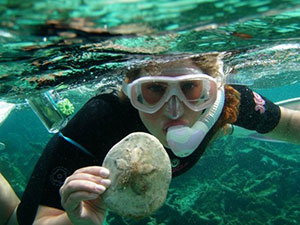
BIO/EES 375: Topics in Tropical Biology
Description: An intensive field experience in neotropical ecosystems (coral reef, rainforests, a cloud forest, mangrove swamps, etc.) that links ecological phenomena with social and historical factors to examine the conservation of biodiversity. Field activities require moderately strenuous exercise and considerable hiking. The course is open to both science and non-science majors.
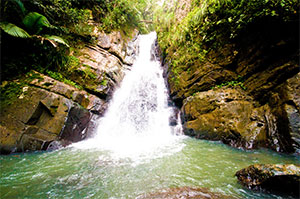
By Björn Söderqvist (Own work) [CC BY-SA 2.0], via flikr
BIO 489: Biodiversity of Harvestmen in Puerto Rico
Description: In this intensive research course, students explore the large variety of biodiversity that exists on the island of Puerto Rico. Students explore rainforests, swamps, and more. Field activities require moderate strenuous exercise and considerable hiking.
Career Outcomes
Virginia Wesleyan graduates who earn a degree in biology are making a difference in the world. Their personalized experience has earned many graduates research grants, national recognition, and the ability to work independently in their research endeavors. Successful completion of the program will enable motivated students to pursue successful careers as:
- Physicians
- Nurses
- Veterinarians
- Biologists
- Environmental Researchers
- Policymakers
- Public Health Professionals
- Scientific Journalists
- and Educators

